|
|
|
Sort Order |
|
|
|
Items / Page
|
|
|
|
|
|
|
| Srl | Item |
| 1 |
ID:
100347
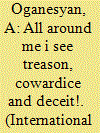

|
|
|
|
|
| Publication |
2010.
|
| Summary/Abstract |
THERE ARE TIMES when the human soul is filled from within with such an overbearing and unassailable feeling of evil and gloom that it requires inhuman power, some extraordinary exploit to overcome it ... This is when the person prone to suicide shouts faint-heartedly: "I don't want to live, and I'm not going to live," while the long sufferer beseeches: "I can't live, but I yearn for Life." This is akin to the Agony in the Garden, when Jesus prayed in such earnest that it was as if great drops of blood were falling to the ground, when he prayed for this cup to pass him by . . . so that the light would not be engulfed by darkness. And not somewhere remote, in far-off galaxies, but right here in the heart, and only then in the galaxies, which, compared with the human heart, are nothing but dust and ashes... "All around me I see treason, cowardice and deceit" are not only the words Emperor Nicholas II used to reproach his contemporaries for forsaking him, they express the agony he felt for them, "for they know not what they do." Had he not felt this agony, the Sovereign's daughter would not have written, "He forgave everyone . . .," which was the message of reconciliation he asked her to give everyone who had remained faithful to him. He also forgave us, only do we really "not know what [we] do ... "? After the toxic gas of the revolutionary propaganda evaporated, after the whole of Soviet historiography had insulted and spit in the face of the royal family, after the archives were opened for public perusal, after the letters, diaries, memoirs, and eye-witness accounts were published, and after we became free to take sober account of the tragedy of the royal family's murder, we suddenly hear from the television screens and from the incompetent historian: "The empress was a idiot." While another philosophizing TV anchorman, primping and preening,
|
|
|
|
|
|
|
|
|
|
|
|
|
|
|
|
| 2 |
ID:
100334
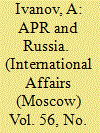

|
|
|
|
|
| Publication |
2010.
|
| Summary/Abstract |
TEN YEARS AGO when the Asian countries were extricating themselves from the 1997 Asian financial crisis few expected the vast Asian-Pacific Region (APR) to become the locomotive of global development of the 21st century. The locomotive, meanwhile, remained as efficient as ever at the peaks of the current world financial and economic crisis. Indonesia (the GDP of which increased by 4.5% in 2009 and is moving toward 6% in 2010) is rapidly catching up with China and India, the new leaders of economic advance in the APR. According to Merrill Lynch in 2009 the total private assets of the APR countries increased by 31% (the world's highest) to reach $9.7 trillion; in the same year the number of dollar millionaires in Asia increased by 26% to come even with the European figure of 3 million (North America is home to 3.1 million). The Boston Consulting Group forecasted that in 2010 the level of wealth in the APR will go up twice as fast as the world's average; this explains a broader and more active involvement of banking giants Barclays, Morgan Stanley and UBS in Asia.
The economic upsurge of the APR is highly important for Russia which is the region's inalienable and fairly large part. When dealing with Russia's application to the Asia-Europe Meeting (ASEM) and the need to include it in either the Asian or European part the Meeting was confronted with the dilemma which had kept the Slavophiles and Westerners busy for a long time. Resolved by famous Russian poet Alexander Blok who called Russians "leafs of the Asian tree" the issue acquired an international political-economic dimension in the globalization era.
|
|
|
|
|
|
|
|
|
|
|
|
|
|
|
|
| 3 |
ID:
100322
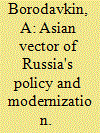

|
|
|
|
|
| Publication |
2010.
|
| Summary/Abstract |
International Affairs": We all know that the APR is developing into another power center as a hub of global economic development with a much greater impact on global politics. What are the main factors behinds its balanced development and what is Russia's role in these processes?
Aleksey Borodavkin, Deputy Foreign Minister of Russia: In recent years, the center of global economic development and political interaction has shifted to the APR where the East Asian export-oriented economies, though hit, together with the rest of the world, by adverse conjuncture, suffered much less of the global financial and economic crisis than Europe and America. The region has retained its role of a driving force of world economy; the national economies are much closer intertwined than before which adds vigor to regional economic integration and stirs up centripetal trends behind the polycentric regional order which is taking shape before our eyes.
Russia, Siberia and the Far East in the first place, should capitalize on its geographical proximity to the rapidly rising region to embrace the innovation development patterns and modernize its economy. The meeting chaired by President Medvedev which took place in Khabarovsk on 2 July 2010 arrived precisely at this conclusion.
From the 18th century onwards, Russia realized itself as a great power stretching from the Atlantic to the Pacific and a progressive civi-lizational project. Our past suggests that we should clarify the priorities to be able to join concrete political and economic projects to the advantage of our people.
|
|
|
|
|
|
|
|
|
|
|
|
|
|
|
|
| 4 |
ID:
100317
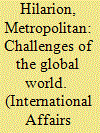

|
|
|
| 5 |
ID:
100324
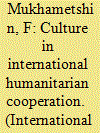

|
|
|
|
|
| Publication |
2010.
|
| Summary/Abstract |
THE NEW CHALLENGES at the start of the new century and the challenging tasks in the realm of international relations in conditions of globalization make Russia's cultural ties increasingly important. Clearly global competition is getting a culture-and-civilization dimension. Globalization processes entail more than interpenetrating and mutually enriching cultures, and they also often endanger the cultural uniqueness of some countries and peoples. The threat of fault lines developing between civilizations calls for collective efforts to start cultural dialogues. Of ever greater importance in this context is to preserve cultural heritage and make greater use of cultural resources in the foreign policy arena.
When he addressed a conference of Russia's ambassadors and permanent representatives to international organizations, President Dmitry Medvedev stressed that "with all the sharp differences in the world arena, there is a clear desire to harmonize relations, establish dialogue and reduce conflicts."1 We should note in this connection that humanitarian cooperation is one of the most effective means to establish dialogue between civilizations, reach accord and understanding among nations, and to end confrontation in the world. It is culture and humanitarian aspects that are increasingly influencing, in the final analysis, the shaping of a modern-day multi-center system of global management and giving it a sense of direction.
|
|
|
|
|
|
|
|
|
|
|
|
|
|
|
|
| 6 |
ID:
100339
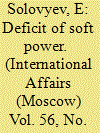

|
|
|
|
|
| Publication |
2010.
|
| Summary/Abstract |
ENERGY REMAINS one of the most important factors in the present-day world. Oil, gas, power engineering and the nuclear power industry constitute the core of Russia's modern economy, making it a serious player on the international arena, a true energy superpower. Oil, oil products and natural gas account for two-thirds of Russian exports. The oil and gas sector largely predetermines Russia's geopolitical positions and its role in ensuring the energy security of the globalizing world. Not surprisingly, the energy factor is regarded as one of the most important means of invigorating our cooperation with the CIS countries and even as an instrument of projecting Russia's power to different countries in the post-Soviet space.1 At the same time the energy sphere is a field of serious conflicts in the modern world. Suffice it to mention the wish of China, the U.S., and some EU countries to secure direct access to the oil and gas resources of Central Asia. Maintenance of its stature as an energy power and the expansion of its capabilities in the energy sphere are in fact closely linked to Russia's ability to strengthen its positions in the neighboring states, primarily in the Caucasus and Central Asia. However, achieving this only through traditional diplomatic methods of the past one and a half to two decades is a complex, almost unfeasible task.
|
|
|
|
|
|
|
|
|
|
|
|
|
|
|
|
| 7 |
ID:
100332
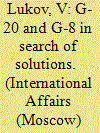

|
|
|
|
|
| Publication |
2010.
|
| Summary/Abstract |
FOLLOWING THE CHRONOLOGY of events, the story of the two summits that took place in Canada in late June should be started with the meeting of the G-8 leaders in Muskoka (June 25-26). However, the logic of global economic development and the changing balance of the two global forums suggest that the first to be analyzed should be the results of the G-20 summit in Toronto (June 26-27).
The summit was conceived as an intermediate one between the Pittsburgh and Seoul summits. The Canada meeting was expected to discuss mainly the implementation of the Framework for Strong, Sustainable, and Balanced Growth. However, due to a number of new financial-economic and political circumstances, its significance increased greatly and so the agenda had to be revised. There were several reasons for that.
Firstly, the sovereign debt crisis in Greece. It showed dramatically what consequences the uncontrolled growth of budget deficits and state debts in the majority of developed Western countries could have for the global economy as a whole. These debts have been accumulated over a long time but their explosive growth occurred during a crisis period, on the one hand, because of government spending on anti-crisis programs and on the other, because of shrinking budget revenues amid an economic slump.
|
|
|
|
|
|
|
|
|
|
|
|
|
|
|
|
| 8 |
ID:
100331
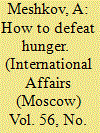

|
|
|
|
|
| Publication |
2010.
|
| Summary/Abstract |
HEADS OF STATE will be meeting in New York in September to see what mankind has done to meet the Development Goals set by the UN Millennium Summit. They will of course focus on the global issue of struggle against hunger and malnutrition which is designated as goal number one.
It is generally believed that we have regrettably made no serious progress in cutting by half the number of starving people around the world by 2015. When for the first time the problem of hunger on the planet was taken up by the World Food Summit in 1996, the number of people who do not have enough to eat was estimated at 840,000,000. This figure regrettably exceeded one million last year against the backdrop of the financial turmoil around the world.
Today 31 countries around the world experience a dire need for food: 20 countries in Africa, 9 countries in Asia and the Middle East and 2 countries in Latin America. Even relatively successful developed countries have millions of residents from the more vulnerable sections of the population who either chronically do not have enough to eat or can't afford quality food. According to some devastating statistics, last year one child died every minute from hunger and related diseases while the total number of hunger-related deaths exceeded those caused by AIDS, ?? and malaria taken together.
This situation is largely due to the food crisis of recent years which resulted from a combination of a number of subjective and objective factors. The chronic lack of attention over many years to the needs of the agricultural sector and lack of funds for it, especially in the developing countries, is an important contributing factor.
|
|
|
|
|
|
|
|
|
|
|
|
|
|
|
|
| 9 |
ID:
100333
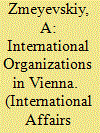

|
|
|
|
|
| Publication |
2010.
|
| Summary/Abstract |
THE IMPORTANCE of the "Vienna international platform" in dealing with topical issues facing mankind in the 21st century has been growing in recent years. It provides conditions for the formulation of a positive, unifying agenda for international relations. One special feature of the Vienna-based universal-format international organizations is that their potential for confrontation is insignificant while the opportunities for constructive cooperation in tackling topical issues, common to all states, are quite substantial.
In the energy sphere, this involves the peaceful use of atomic energy (IAEA), the promotion of energy saving and energy efficiency by developing and disseminating new technologies (UNIDO); in the security sphere, nonproliferation of nuclear weapons and "sensitive" technologies, fighting international organized crime and drug trafficking (the IAEA, the NPT Preparatory Committee, the United Nations Office on Drugs and Crime, the Wassenaar Arrangement, etc.); in the sphere of research, analysis and forecast of international development trends, the International Institute for Applied Systems Analysis (IIASA), and etc.
There is an increasing need for this creative potential today when there is a growing understanding in the world and at the United Nations in particular that it will be impossible to solve global problems through unipolar approaches, sheer pragmatism and narrow state preferences.
|
|
|
|
|
|
|
|
|
|
|
|
|
|
|
|
| 10 |
ID:
100345
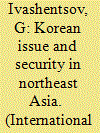

|
|
|
|
|
| Publication |
2010.
|
| Summary/Abstract |
IN NORTHEAST ASIA, Russia's domestic and external interests are interconnected like in no other region. The guarantee of Russia's future as a great power lies in the economic, technological and social development of Siberia and the Far East. In regard to this vast region, the country's leadership has now set ambitious, far reaching goals whose accomplishment is to produce great results. There is no doubt that the stable development of Siberia and the Russian Far East with their natural and other resources will be comparable in its effects to the development of the West in the United States more than 100 years ago if it does not exceed them. It will, without a doubt, make an impact on all development processes both in the Asia Pacific region and outside.
The Legacy of the Cold War
THE RESOLUTION of domestic problems requires the absence of external threats. The main source of the military threat in Northeast Asia is the 60 year military confrontation on the Korean Peninsula. The Korean War started on June 25, 1950 between two Korean camps - the North, which strove to use the Soviet model for the country's unification, and the South, which committed itself to U.S. standards. In the context of the Cold War that local armed clash developed into a large scale military conflict which had almost put the world on the brink of a nuclear war. The great powers - the United States, Britain, the USSR, and China, as well as the UN, which started working on the Korean issue in 1947 and in 1950 actually became a party to the war - were directly or indirectly involved in the Korean War.
|
|
|
|
|
|
|
|
|
|
|
|
|
|
|
|
| 11 |
ID:
100343
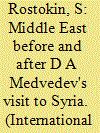

|
|
|
|
|
| Publication |
2010.
|
| Summary/Abstract |
ON MAY 11, 2010, the temperature in Damascus was significantly higher than average. Nevertheless, 37 degrees Celsius did not affect the program of the Russian president's visit. As planned, D.A. Medvedev and Bashar Assad met in the afternoon on the main street of the "old town,'' known two millennia ago as Via Recta.
From the place where the historical street reaches the Eastern Gate (Bab Sharqi), the Russian and Syrian presidents walked to the St. Ananias Chapel. In a narrow side street, packed with antique shops and restaurants, people were coming out from their apartments on upper floors to greet D.A. Medvedev and B. Assad. The atmosphere was extremely relaxed and informal.
It was the first time that the presidents communicated with each other, without a translator, on common topics. B. Assad told his guest about the unique history of old Damascus, the oldest capital in the modern world. The walk probably became the culmination of the visit, emphasizing the remarkable level of personal trust that the two countries' leaders had achieved in their relations.
|
|
|
|
|
|
|
|
|
|
|
|
|
|
|
|
| 12 |
ID:
100337
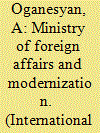

|
|
|
|
|
| Publication |
2010.
|
| Summary/Abstract |
IN ANTICIPATION OF the President's visit, the Ministry of Foreign Affairs on Smolensky Square was spruced up fit for a king. The marble was polished until it shone, and all the cars were removed from the parking lot. The pompous conference hall, which has seen more auspicious occasions and guests in its time than one would care to count, removed its crimson red apparel to don a shade of subtle terracotta instead. The ministry's new emblem, approved the previous day by the President, adorned the wall with its heraldic symbol emblazing the center, while each of the eagle's talons clutched a palm branch distinctly reminiscent of goose feathers. The image does not seem complete, however, without the wax-sealed scroll, the prototype of old embassy dispatch...
The atmosphere of intense anticipation was defused by the President's delay; he would not arrive and deliver his speech for another three hours. This gave Minister of Economic Development Elvira Nabiullina, Chief of General Staff Nikolai Makarov, Chairman of the Russian Union of Industrialists and Entrepreneurs Alexander Shokhin, and Chairman of the Management Board of the Institute of Contemporary Development Igor Yurgens the opportunity to speak at the very beginning of the meeting. They were listened to attentively, just as the audience listens to the overture at the opera while the curtain is still closed before the main performers appear.
|
|
|
|
|
|
|
|
|
|
|
|
|
|
|
|
| 13 |
ID:
100327


|
|
|
|
|
| Publication |
2010.
|
| Summary/Abstract |
FRESH CHALLENGES arise before economic diplomacy now when Russia is pulling out of the crisis while there still lingers the threat of a new spiral of debt problems in the world economy.
It is not sufficient, in the prevailing situation, to create optimal conditions for key Russian exports, even though it is bound to remain an important job of our embassies and trade missions. It is more important to create conditions for foreign economic assistance in a bid to modernize the economy and make it more reliant on innovation.
Transformation of the economy calls for moving to a new level of interaction in several areas between business interests and Russia's embassies in other countries.
The first area is the legal framework of international cooperation in the economic sphere.
We have achieved appreciable progress over recent years with regard to international agreements in certain fields. The most striking example is the creation of the Customs Union. As regards Russia's joining the WTO, the talks are taking longer than planned. As for joining the OECD and signing a new agreement on partnership and cooperation with the EU, there has been no significant headway because WHO membership is yet to be a certainty.
I would also welcome more clarity as regards the operating multilateral agreements. It's fine to have hotlines open to business interests to thrash out problems of putting in place the Customs Union. It's bad when officials cannot anticipate possible problems.
It is of critical importance for business interests to know realistic time frames for concluding agreements, although this understandably depends largely on our partners abroad.
|
|
|
|
|
|
|
|
|
|
|
|
|
|
|
|
| 14 |
ID:
100329


|
|
|
|
|
| Publication |
2010.
|
| Summary/Abstract |
FIRST OF ALL, I propose dispelling the perception - which, alas, still exists in the West - of the "inability" of Russia's economic and social sectors to modernize themselves and as a result of that, the conclusion that any modernization can only be brought to Russia from the outside. Such delusions are based on the notion - as persistent as it is erroneous - that the West is the main, if not the only source of ideas and keeper of modernization know-how.
In reality, the concept of modernization is not alien to our country, our national character or our history.
Over the past 300 years Russia has been repeatedly confronted with the challenges of modernization - under Peter the Great, who, in a well known expression, "fought barbarity by barbarous methods;" in the mid-19th century, during the dispute between the Slavophiles and "Westerners" as to whether Russia should borrow foreign experience or rely on its "national identity;" and in the 1930s-40s, when the Soviet Union achieved an impressive technological breakthrough but at an excessive price.
So the main distinguishing feature of the current situation, when we are once again facing the challenge of modernization, is not that it has become an imperative for the country's successful economic development. It is that the present conditions, the economic, scientific, technical and especially ideological and legal foundations for modernization differ drastically from those that existed previously. Therefore the task confronting the country now will be dealt with by essentially different means and methods.
|
|
|
|
|
|
|
|
|
|
|
|
|
|
|
|
| 15 |
ID:
100320
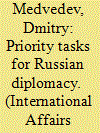

|
|
|
|
|
| Publication |
2010.
|
| Summary/Abstract |
In the two years that have passed since our last meeting, the world has changed significantly, although we always use that phrase - it's a truism of sorts. Still, it is absolutely accurate when applied to the last two years.
These changes include the August 2008 events in the Caucasus, the global financial crisis shortly after that, and our decision to begin modernizing Russia's economy and changing its political system.
|
|
|
|
|
|
|
|
|
|
|
|
|
|
|
|
| 16 |
ID:
100341


|
|
|
|
|
| Publication |
2010.
|
| Summary/Abstract |
THE PARLIAMENTARY ELECTIONS in Germany* and the subsequent new government coalition put once again on the agenda the future of Russo-German relations. Losing in the elections, vice chancellor Frank-Walter Steinmeier, who developed the partnership for modernization concept, left the new government together with the Social Democrats. ** Remarkably, this concept, which arose from cooperation between Russia and Germany, was proposed as the basic model for developing relations both between Russia and the EU and between Russia and other countries of Europe. The place of the SDP, historically geared to constructive cooperation with Russia, was taken by Free Democrats headed by Guido Westerwelle, who traditionally criticize Russia and its leadership. Observers had some fears about this very politician who filled the position of foreign minister (the impression right at the start of the new coalition's activities was that he could bring discord in relations between Germany and Russia).
The fears proved wrong, however. The new government's statement, unlike the statement of the previous government, had no mention of a strategic nature of the partnership and it sounded more reserved about the objectives and prospects of relations with Russia. This seems to have become even a positive factor because it put an end to needless debates about the meaning of strategic partnership. As a rule, German and European experts had opposing views of this partnership.
|
|
|
|
|
|
|
|
|
|
|
|
|
|
|
|
| 17 |
ID:
100335


|
|
|
|
|
| Publication |
2010.
|
| Summary/Abstract |
TODAY, THE EXPERT COMMUNITY in Russia, let alone the public, knows next to nothing about NATO information and propaganda efforts while what is called public diplomacy can be described as one of the key aspects of its activities.
What Is Public Diplomacy?
SO FAR, the world has not agreed on the concept's comprehensive definition and uses several interpretations the earliest being supplied in 1965 by Dean of the Fletcher School of Law and Diplomacy, Tufts University Edmund A. Gullion: "Public diplomacy refers to government-sponsored programs intended to inform and influence public opinion in other countries." This obviously presupposes that public diplomacy recurs to very specific means and methods to achieve specific aims. I will use this as a starting point for my summary of what has been said about public diplomacy by those who theorize about it and who apply its principles in practice.
|
|
|
|
|
|
|
|
|
|
|
|
|
|
|
|
|
|
|
|
|